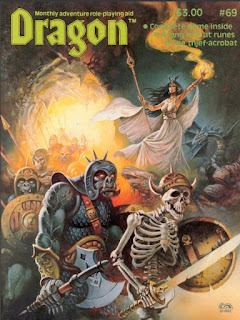The Articles of Dragon: "A Split Class for Nimble Characters: the Thief-Acrobat"
 Issue #69 of Dragon (January 1983) is another one about whose articles I have very strong memories. The strength of my memories is bolstered, no doubt, by the issue's remarkable cover by Clyde Caldwell. Caldwell's an artist about whom my feelings are generally mixed, but I've nevertheless got a fondness for this particular piece, which, in some ways, encapsulates the vibe of the dying days of D&D's Golden Age. Consequently, I'll be returning to this issue several times in the coming weeks.
Issue #69 of Dragon (January 1983) is another one about whose articles I have very strong memories. The strength of my memories is bolstered, no doubt, by the issue's remarkable cover by Clyde Caldwell. Caldwell's an artist about whom my feelings are generally mixed, but I've nevertheless got a fondness for this particular piece, which, in some ways, encapsulates the vibe of the dying days of D&D's Golden Age. Consequently, I'll be returning to this issue several times in the coming weeks.
This week, though, I want to look at Gary Gygax's "From the Sorceror's [sic] Scroll" column, in which he provides full details on the thief-acrobat "split class" that he first mentioned in a previous column. A split class is a specialization path for an existing class, in this case the thief. Provided he has the appropriate ability scores requirements (STR 15, DEX 16), a thief can, upon attaining 6th level, choose to devote himself to acrobatics as an outgrowth of his thievery – in effect, becoming a cat burglar or second story man in criminal parlance.
At the time of this article's publication, this was a comparatively unique concept, one that Gygax claims "has not been expressed before" and for which there is "nothing similar" in AD&D. I'm not entirely sure this is true. As I mentioned previously, the thief-acrobat reminds me a bit of the original concept for the paladin class, as found in Supplement I to OD&D. Likewise, the AD&D version of the bard, in which a character must first attain levels in fighter and thief before becoming a bard, is in the same ballpark in my opinion. Even so, the precise arrangement Gygax presents for the thief-acrobat isn't one we'd seen before.
I liked the idea of the thief-acrobat more in principle than in fact and my friends held similar views. Only one of them ever chose to pursue this split class and the player soon grew bored of playing him. That was probably the biggest problem with the thief-acrobat: it was very specialized and thus of limited utility. This is the kind of class that I could see thriving in, say, an urban, all thief campaign, where each character needs to distinguish himself from his fellow thieves. In a more traditional dungeon-based campaign, I think the thief-acrobat hold much less or appeal – or at least that's how my friends and I viewed it.
When it comes to the question of designing character classes, there are a couple of common approaches, neither of which is without its problems. Dungeons & Dragons began with only a few broad, archetypal classes, like the cleric, fighting man, and magic-user, but soon added many more, each one devoted to a narrower but nevertheless real archetype. AD&D opted for a larger list of available classes, while the D&D line kept to something closer to the original, narrower list. Each approach has its advantages and disadvantages and I can easily defend them both.
Had Gygax remained at the helm of AD&D, we would certainly have seen more classes added to its roster, some of which, like the thief-acrobat, would have been quite narrow in their utility. That's not necessarily a problem, but it can add a lot of unnecessary complexity to the game, not to mention diluting the game's flavor. On the other hand, a goodly selection of classes can, if presented properly, increase the game's flavor, with each one revealing more about its explicit or implied setting and the sorts of activities characters are expected to undertake within it.
Whether the thief-acrobat succeeds in doing any of these things is an open question, hence my own ambivalence toward it. Even so, this article sticks in my mind, because, like others written by Gygax at the time, it offered a sneak peek into his evolving vision of AD&D. It was a really interesting time to be a fan of the game and I'm glad to have been around for it.
James Maliszewski's Blog
- James Maliszewski's profile
- 3 followers



